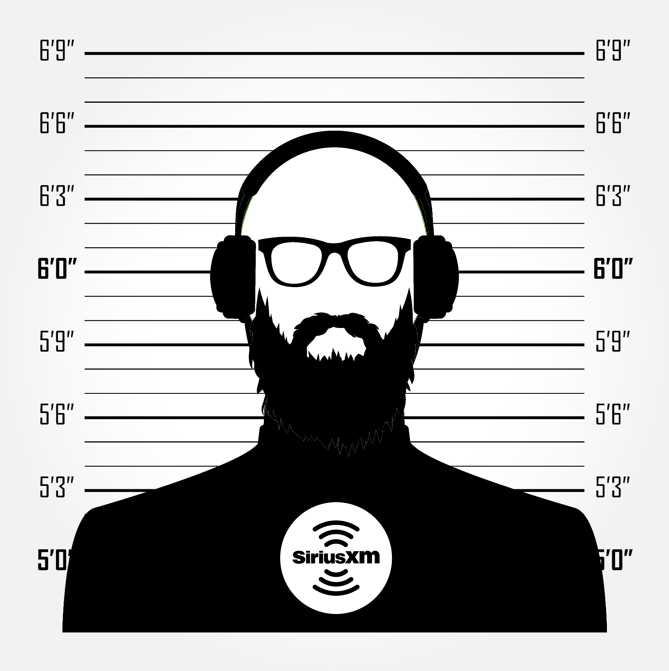
Another day, and another indicator SiriusXM is taking no prisoners in its march to truly go after broadcast radio’s near-century long franchise. Other players have talked about their desire to erode AM/FM radio’s share of audience and revenue. But the satellite radio threat is the one that poses the most serious threat to broadcast radio as we knew it.
Yesterday’s headline confirmed the rumors: SiriusXM has completed its purchase of Stitcher, buying the podcasting company (along with Midroll) 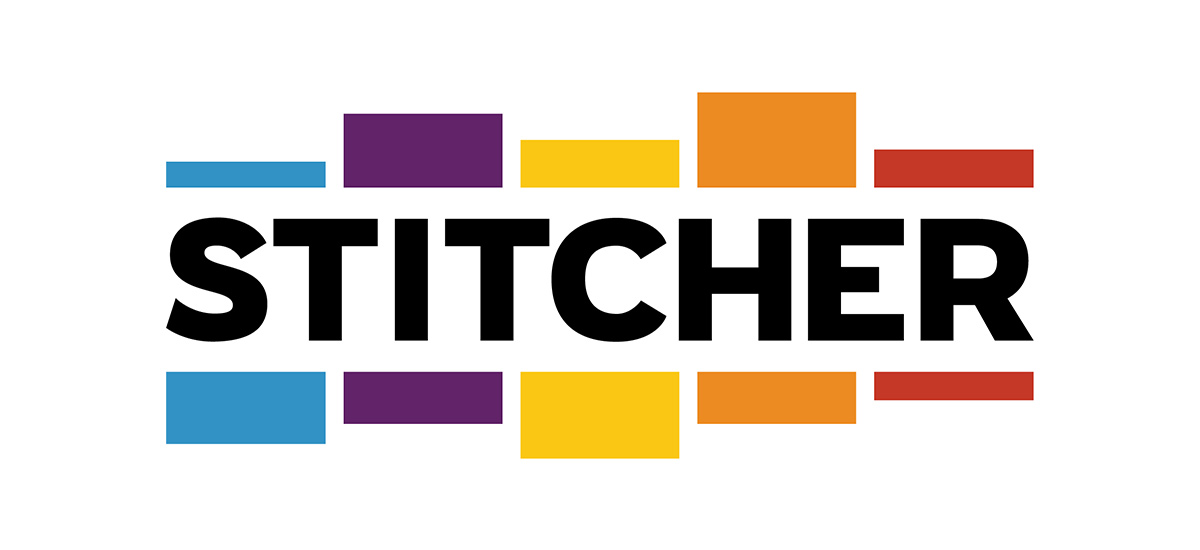 from Scripps for $325 million.
from Scripps for $325 million.
And let’s not forget that among their other holdings, SiriusXM took the big leap when they purchased one of the original streaming players – Pandora – in 2019 for $3.5 billion, giving the satcaster another way to augment its portfolio.
Yet, when you ask many people in radio which of its competitors represents the greatest existential threat, many mention Spotify. Or podcasts. But rarely do they view satellite radio as their top challenger – radio’s public enemy #1.
Today’s post lays out 10 reasons why SiriusXM constitutes the toughest challenge to broadcast radio.
1. SiriusXM is most similar to AM/FM radio. By sound, by style, by format, and by personalities, they provide a very similar -but importantly different – experience: no commercials on their music channels, more channels, and the ability to carry a signal all over the country.
But perhaps it’s the demographic similarities that are most striking. Music streaming services, podcasts, and social media all lean younger – with the highest usage typically coming from Generations Y and Z. But satellite radio is one of the few tech media platforms that skews older – yes, just like broadcast radio.
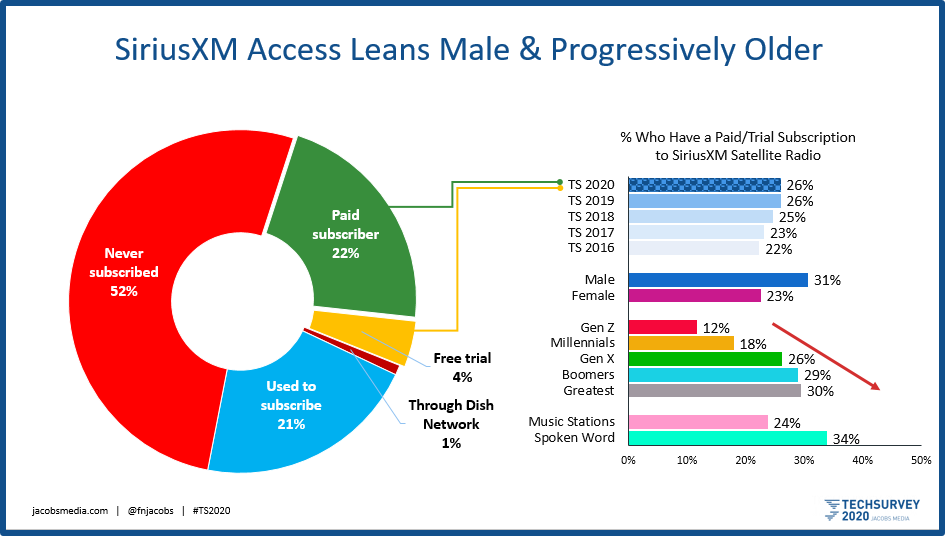
2. They are heavily connected to cars. Like broadcast radio, the lion’s share of listening to satellite radio comes when consumers are moving on four wheels. And like AM/FM, there’s an important partnership in place with automakers. As a result, satellite radio isn’t just available when you buy or lease a new car – it’s typically free for 6 months or a year.
That’s proved to be a perfect sampling tool, snaring car owners into continuing the service long past the trial period elapses. And when broadcast radio listeners acquire a “connected car,” their AM/FM listening tends to shrink, while their satellite radio usage goes up.
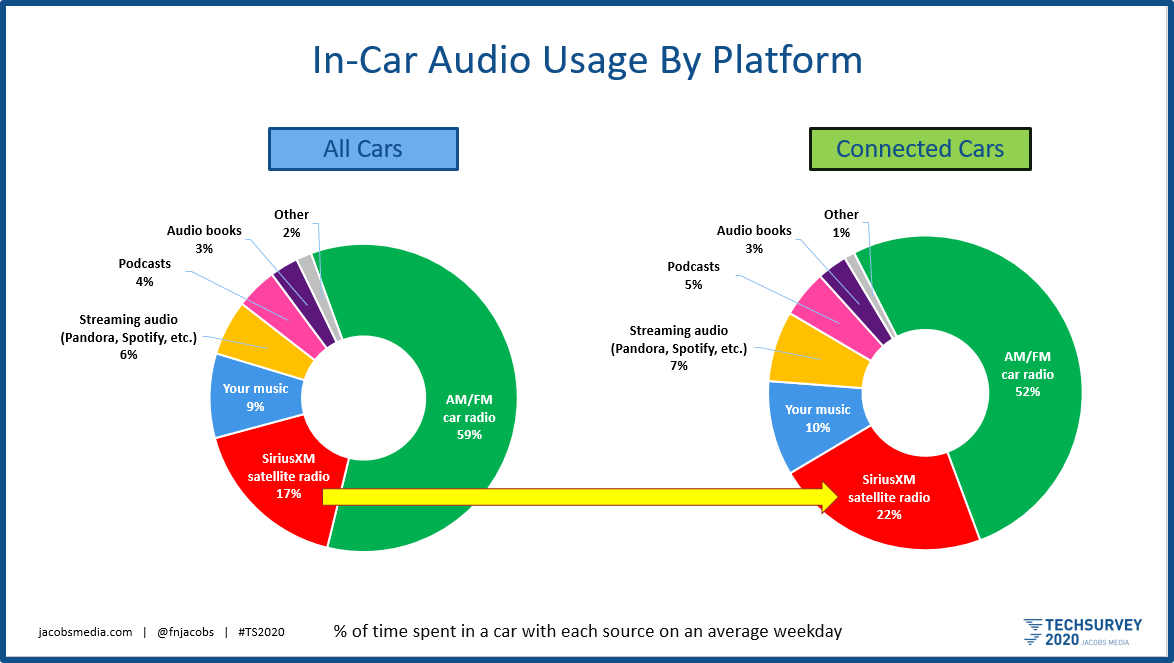
3. They are betting heavily on voice. To become less dependent on in-car listening, SiriusXM connected with Amazon in 2019 to ensure their 300+ channels would be available by simply barking out a command to “Alexa.” This smart speaker distribution feature has no doubt come in handy during COVID-19 when so many Americans are no longer spending much time in their cars.
But to remind us just how aggressive and focused on multi-location the strategic team at SiriusXM is thinking, they sent their subscribers an attractive discount last week. That’s right – for the cost of a Whopper and a chocolate shake, you can have an Echo Dot on your nightstand streaming Howard 100.
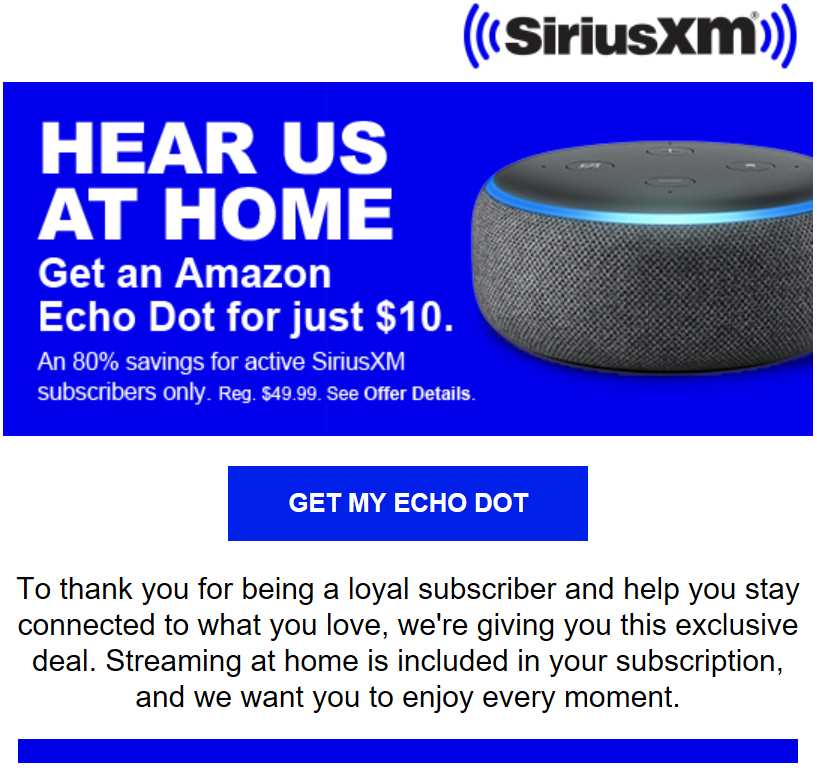
4. They have a solid music streaming asset with Pandora. Granted, it has lost share to Spotify in recent years, Pandora is still a force to be reckoned with on the digital menu. It also provides another key form of audio content and entertainment, as well as access to millions of mobile phones that already have the app. Music streaming is a key component in building SiriusXM’s media menu.
5. Podcasts are becoming a bigger piece of the SiriusXM portfolio. In addition to the Stitcher deal, SiriusXM has been busy since the pandemic took off,  purchasing Simplecast last month, another sign podcasts will be a part of their burgeoning content and distribution empire. At the same time, they also bought AdsWizz to facilitate a better podcast advertising experience.
purchasing Simplecast last month, another sign podcasts will be a part of their burgeoning content and distribution empire. At the same time, they also bought AdsWizz to facilitate a better podcast advertising experience.
The need to escape the onerous streaming royalty fees (a reason why Spotify is heading in this same direction) is part of SiriusXM’s thinking. But as podcast consumption increases, they’re also well-positioned to take advantage of the on-demand audio trend.
6. They have celebrity. We’re not just talking about influential former broadcast radio jocks, from Jim Ladd to Cousin Brucie to Kid Leo to Nik Carter. SiriusXM has done a marvelous job partnering with some of the biggest names in music for prominent special programming or dedicated channels: Tom Petty, Little Steven, Billy Joel, U2, Dave Matthews, Michael Bublé, Bruce Springsteen, Kenny Chesney, Ozzy Osbourne, and many others.
And on the News/Talk side, all the big networks are in the channel lineup – including Fox News, CNN, NPR, MSNBC, CNBC – as well as big names like Michael Smerconish, Dr. Lauara, and Dave Ramsey.
7. Howard Stern. Let’s not forget their anchorman – their cleanup hitter is none other than once broadcast heavyweight, Howard Stern. Howard’s  defection to Sirius in 2006 was a big move for him – and for satellite radio. It helped legitimize their brand, bringing credibility and stardom to their portfolio. The fact Howard continues to be a prominent part of SiriusXM’s profile speaks volumes about his continuing star power.
defection to Sirius in 2006 was a big move for him – and for satellite radio. It helped legitimize their brand, bringing credibility and stardom to their portfolio. The fact Howard continues to be a prominent part of SiriusXM’s profile speaks volumes about his continuing star power.
Could satellite radio get along without Howard Stern’s content and his tacit endorsement? Perhaps. But given the choice, Howard’s presence is important. As SiriusXM CEO Jim Meyer made it clear at a conference just last month, “I don’t see any reason why we won’t pick up the pace on those discussions. I want Howard to work at Sirius XM for as long as Howard wants to work.”
That says a lot.
8. The subscription model provides financial stability. While there is advertising on some spoken word satellite radio channels, the bulk of their revenue comes from those monthly subscriber fees, a trend that is growing in popularity over the last decade, and particularly since COVID-19.
Radio listeners have come to detest commercials – especially those long stopsets – and a growing number of consumers would rather shell out a few bucks a month than be bombarded each hour with commercials that have become less and less entertaining and relevant over time.
9. They have data. Thanks to their 30 million subscribers (as well as those who have left the platform), SiriusXM  has a great deal of personal and media usage metrics on a large group. Add to that, Pandora’s 60+ million users in the U.S., along with Stitcher’s 8 million users, and you’ve got scale.
has a great deal of personal and media usage metrics on a large group. Add to that, Pandora’s 60+ million users in the U.S., along with Stitcher’s 8 million users, and you’ve got scale.
Yes, broadcast radio has many million more listeners each week. But the satellite radio brain trust has better data, including credit card information.
While public radio and Christian radio might make that same claim, much smaller percentages of their audiences actually provide financial support.
10. They have an aggressive distribution strategy. SiriusXM doesn’t care which device you choose or where you listen. They have rapidly moved to ensure access on myriad platforms and gadgets. And as importantly, they are marketing and promoting the many ways and places subscribers experience their content, especially on the increasingly important home front.
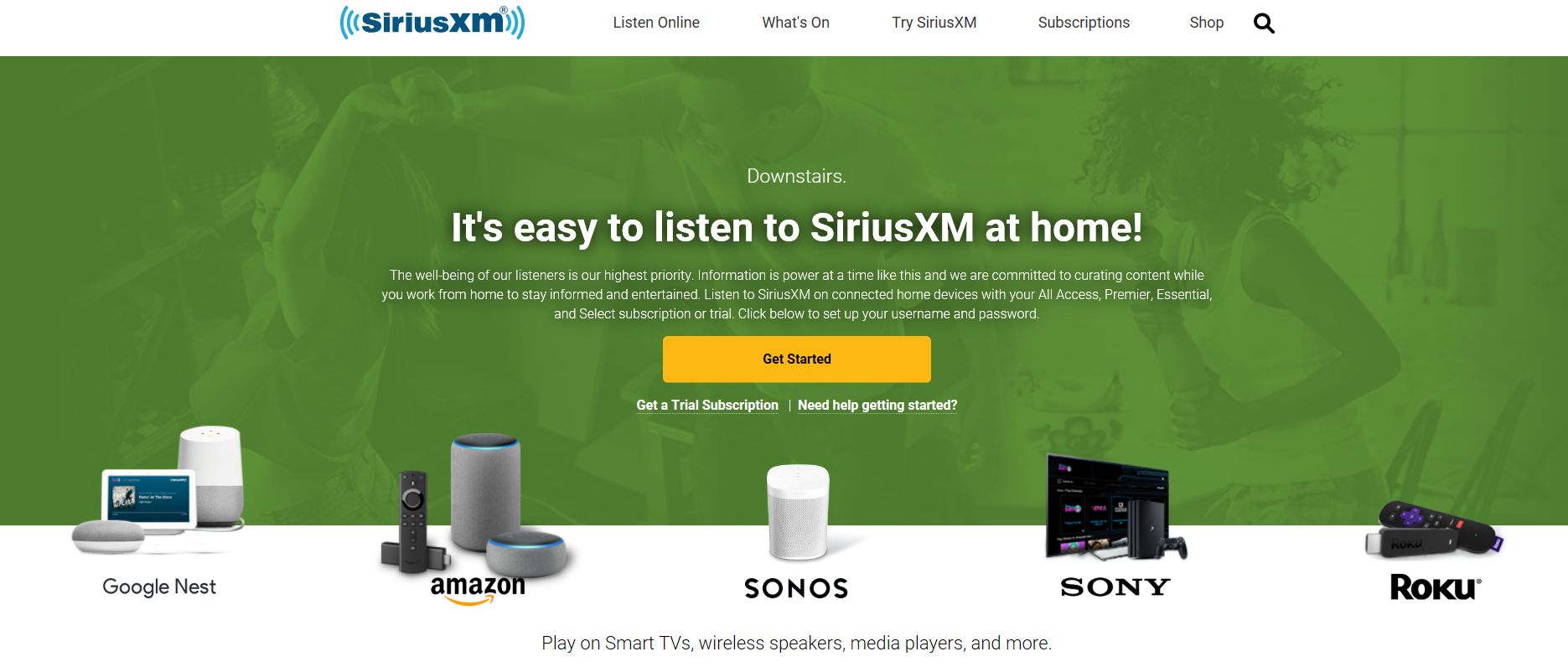
Like all mass media in 2020, radio broadcasters have their hands full.
But planning and strategy can be better focused when you have a solid understanding of who wants to eat your lunch – and your breakfast and your dinner.
To be sure, the AM/FM platform has longevity, habit, trust, and connection as assets. It is the one medium that has the ability to be real-time, in the moment, and reflective of the communities it serves. As we’ve learned during the COVID-19 crisis, these strengths set it apart from the pack.
And yes, let’s not forget it’s free.
Radio broadcasters need to be clear-eyed about their competition.
Satellite radio is in the rear-view mirror, and coming up quickly in the fast lane.
- Media And Technology In 2025: Believe It Or Not! - April 18, 2025
- In Radio, You Just Never Know - April 17, 2025
- The Secret To Making A Great Podcast (And Great Radio) - April 16, 2025




Thank you, Fred. All the more reason for every radio operator to deliver and receive the most impact from every licensed signal. Excellent, minimal cost creativity developed ’60s-’70s FM. Time to do it again, with what we’ve learned and new connections.
Hope so, Clark. The competition gets more formidable with each passing month. Thanks for chiming in.
I alluded to it the other day, Fred, but now you have brought it up directly, so I’ll say it again: Terrestrial radio must play to its comparative strengths, the things satellite radio is not–and, technically, cannot be. First and foremost, locality; SiriusXM can’t focus on my community the way my local broadcasters can (and insofar as my locals aren’t doing that they’re losers already, because I’ll turn to satellite or stream). Second, audio quality; even a well modulated analog signal is superior to the compressed signal of XM, vastly so to that of Sirius, and a terrestrial HD Radio signal simply blows them away. If you’re a music station, that has to mean something because people who really listen can tell the difference. Aren’t those the listeners you want?
Terrestrial broadcasters squander these at their peril. They are not just leaving money on the table, they risk losing the table entirely.
Thanks for re-entering this conversation, John. I was hoping to hear from you on this one. You are correct that it’s about comparative strengths & weaknesses between radio and the competition. Hopefully, this post focuses attention on SiriusXM as radio’s most relevant nemesis. Thanks for these on-point comments.
Glad to be a part of the conversation, and while I’m at it give a shoutout to my friend Dave Kolesar, whose MA3 experiment (under a temporary authorization) at WWFD-AM 820 Frederick, Maryland, points toward saving the AM band for those of us who care about radio and audio. Give it a listen the next time you visit the DC area, it sounds great.
Done, John. Thanks again.
Sirius is not only a terrific innovation, but an unforced error. Corporate radio lost its imagination and creative energy a long time ago. Time is worth more than money – we all knew it when it came to cable tv, and now it’s proven again. Quality content is a treasure.
Fred: Being the guy that changed and put together the unique direction of Sirius adding in house originated content (both talk and music), along with a clearing house for the big networks, I totally agree. The company has very lucky with the timing of its top leadership. When Walt Sabo called and asked if I would be interested in becoming the VP of talk programming for Sirius, we were lucky enough to have Joe Clayton at the helm. He listened and allowed us to put dollars behind programming. He made me EVP of programming and allowed us to negotiate with sports franchises; NBA, NFL, NASCAR, to name a few. We put on the first LGBTQ+ channel. We reformatted the music and the way we organized our music channels. Walter and Scott Greenstein then pushed hard for even more programming dollars and were willing to let me take the lead. This included the 3 of us pressing to bring Howard on board.
Mel Karmazin was the perfect person to follow Joe Clayton. Mel brought structure to the way things were run. He improved our revenue structure, subscription and commercials and worked the bottom line hard. He was first to negotiate music licensing and got the deal. He saw the beauty of bringing in more high-powered talent and giving them their own channels. He purchased XM, eliminating the competition. Mel also saw the takeover by John Malone’s Liberty Media Corporation and then retired.
Jim Meyers took over as CEO and, again, is the perfect choice for the times. Jim was a Clayton hire and I had the pleasure of working with Meyers in those early days. He is a savvy and fair manager. He lets those he works with do their jobs and listens to their ideas. Under Jim, and with the understanding and drive of Liberty Media, SiriusXM has become what we set out to invent.
Fred you are correct, their management team continues to be top notch. They have forwarded vision and have the dollars to block any aggression. Their recent strategic partnerships are smart and on point.
If I owned radio stations of any format, I would be looking for ways to emphasize areas that SiriusXM cannot do. Radio syndicated or not should think local, local, local. Local production, and if you can afford it, as many local personalities (music, talk, news) as dollars will bear. Pick your fight and stay with it remembering that the competition is exactly what Fred says it is. Sirius/XM.
Jay, this is a great comment, providing context to the conversation. And we both ended up at the same point – as good as SiriusXM is (and given the ways in which it has improved). radio broadcasters need to whip out the S.W.O.T. analysis and focus on investing in, growing, and marketing its strengths.
My weigh-in is solely anecdotal and personal. Serving on the broadcast content side, corporately we “eschewed” XM and Sirius in the beginning. That is until the local C-Jazz station, The Wave, “waved” goodbye to is format, disappearing into a sea of pop. I signed up immediately for subscription satellite radio and Watercolors filled my cup. Sadly (don’t tell any client we serve), I now rarely listen to local radio. As you note as well, my new Audi makes it easy to switch stations simply at my command (or, I will admit, play my own favorite tunes out of 3000+ playlist). As to Reason #7, not for me at all. But a fan of Sirius/XM, I am.
Peggy, thanks for the candid comment (even about #7!). SiriusXM has done a great job of filling format holes left vacant by radio broadcasters – jazz, classical, oldies. It’s sadly becoming a longer list. Hope all’s well.
In addition to SIriusXM I listen to two AM/FM college radio stations in my local area. I don’t generally listen to the “corporate” stations generally play the exact same music over and over. Corporate stations very rarely play new or independent artists. Instead, they just play whatever the big record companies send them. Case in point: I heard an artist on SiriusXM a full four months before their music made it to the AM/FM stations. If AM/FM stations started actually playing music people liked they may be able to keep their customer base.
Doug, no argument about your last statement. Keep in mind SiriusXM are not burdened with having to achieve ratings success in order to set rates for commercials. Because it is a subscription based system, they only need to please their fans with a channel (or two or three) that make it worth paying $5-10 month. It’s a similar to analogy between services like Netflix and network TV. Both are viable, of course, but measured on different criteria. Thanks for the comment.
Greetings,
Very well put.
The SiriusXM group was well aware that Many automakers would include the Function in many New Cars.most every Rental car offers this feature. Drawing in Potential sample custoner base. Its Time For Terrestrial and Podcast folks to remember to keep their ace in the hole.. And that is local content..before everything AM FM becomes obsolete. There are Great Podcastets still podcasting and Online stations doing great work.
But they need to concentrate on local content Now.
Great article Mr.Jacobs.
Appreciate it, Brian. The local benefit is an obvious one for broadcast radio, but not enough local broadcast radio stations are programming to that opportunity.
I’ve been with Sirius XM for seven years. Sure, they have no commercials, but their DJ’s are always promoting groups, and when the release of their next recording will come out, especially on Channel 26, Classic Vinyl. My point, they talk too much. When I first got SiriusXM, there would be no talking for hours, except for the occasional station ID. Now, forget it, blah, blah, blah, all the time
Bebe, for better or for worse, most of the DJs on SiriusXM are former broadcast radio people. If you’re looking for lots of music with no talk, that’s where Spotify and similar services shine.
Hi Fred,
Do you feel if SiriusXM ever drops the subscription and makes it free that it would be over for AMFM radios dominance pretty quick? Is it even possible they could become a free service?
It would be a tough putt for them to become free, especially if they want to differentiate from broadcast. The subscription economy is strong (for now), but with so many content creators asking for $5-10/month (or more), there may be more pressure on some of the weaker brands. Thanks for the comment, Chris.
I’ve been conceren (and still surly) since they were granted their license. Lotsa missteps but lotsa great moves. Radio? Yankee great (sorry Fred) Wee Willie Keeler – “Hit ’em where they ain’t”
Another street smart, Willie, Tom. Thanks for chiming in.
Fred,
Stern brought me here. I heard him talking about your article yesterday on his 7/15 show. All good stuff, you may enjoy listening to it on their app on demand but you prob heard it or got word of it already is my hunch.
Question 1
How on earth can SIRI be priced less than A. XM when they bought them, B. Pandora, both of which were well above $30 per share for awhile (Pandora was at $60 as I recall briefly) and do you foresee them rising to those levels…or beyond…at some point?
Question 2
Do you think their strategy of buying all these different companies, XM (created a virtual monopoly by doing so, even though yes there is other various competition), a company to integrate in car payments etc. that never amounted to anything yet (the name has slipped my mind), Pandora, Stitcher Podcasting, and even a stake in SoundCloud is to somehow integrate them all together, and if so how would you suggest they do that? Or could it be to just get so much stuff under their belt to become an attractive buyout opportunity? If so any thoughts on who could/should buy them (not sure this would be an option since Liberty Media probably wouldn’t allow it, right?) Nevertheless, both options would bode well for the stock I would think, circling back to my first question in a sense.
Thanks in advance.
After 30 years in radio, I’ve spent most of my time lately moving toward engineering podcasts and production for streaming and satellite services.
There are a lot of experienced vets from radio who find themselves one of the many who have been laid off in favor of a smaller, less experienced staff. Large companies are also importing in big market personalities in favor of local small town talent. Tough to get a start in a business that has fewer and fewer small market opportunities.
I love radio and miss it, but the big corporations have decimated the once fertile ground for rising talent. Radio painted itself into this corner. Now they are paying the price.
Self-inflicted wounds, compounded by the ravages of competition, Chuck. Hope your “relocation” plans are going well. Many, many former radio people have great skills that are very transferable to similar lines of work. Thanks for weighing in.
Fred,
You cannot overestimate the biggest obstacle facing commercial, broadcast radio today. The over saturation of commercials. In the car today, I tuned to a local FM music station. The spot break had already begun, and I counted EIGHT spots that followed. Who is going to sit through all that (besides someone counting to see how many there were going to be)? And, if I was an advertiser, I sure as heck would not want to be at the end of that break.
I know commercial radio has to have commercials but there must be a better way. One that comes to mind is the old Musicradio WABC. Eighteen minutes per hour of commercials- but they were entertaining. Many were read live by Dan Ingram, Ron Lundy, et al.
I guess I’ll just stick with NPR and Sirius/XM.
Steve, there’s no question you peak or many radio listeners. The spot load got out of control a couple decades back, and subscription media (like SiriusXM, Spotify, etc.) have capitalized on it. To make matters worse, the conventional wisdom in PPM markets is that more stopsets are bad or time spent listening. And as you point out, better commercials wouldn’t hurt (although I still have nightmares over Oxy 10 and Crazy Eddie). Thanks for commenting.